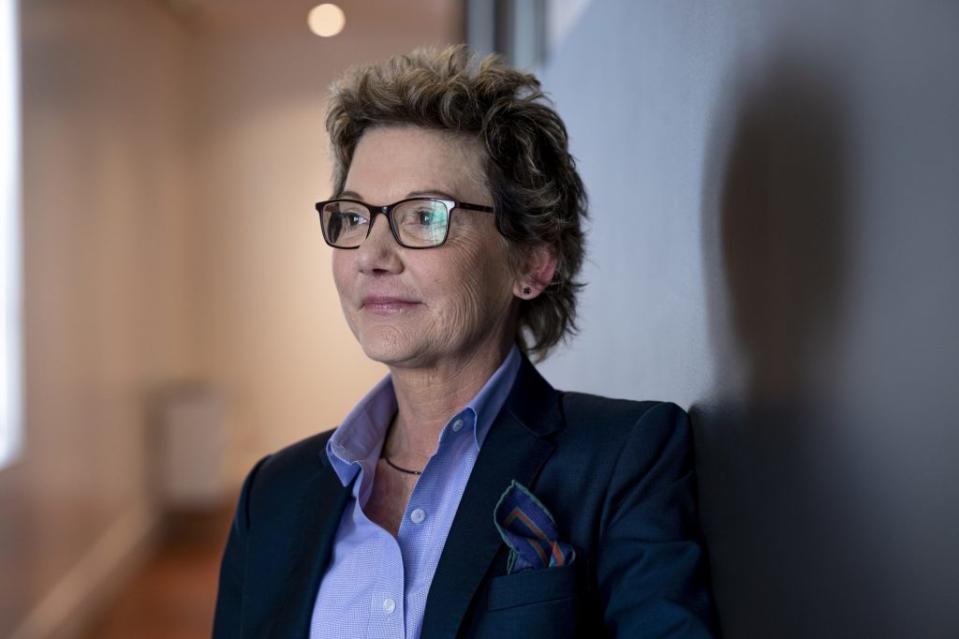San Francisco Fed President Mary Daly’s unlikely rise from high school drop-out to inflation fighter: ‘I’m short, I’m female, I’m gay, and I come from a crooked path background’
Good morning, Broadsheet readers! The first over-the-counter birth control pill will soon be available at major pharmacy chains, France enshrined abortion rights in its constitution, and we hear from San Francisco Fed president Mary Daly. Have a lovely Tuesday.
- Behind the policy. San Francisco Federal Reserve President Mary Daly has consistently advocated for bringing down inflation. Her conviction in that viewpoint comes from her upbringing in Ballwin, Mo., where she watched the fallout of Fed chairman Paul Volcker’s 1970s inflation crackdown.
“Both of my parents lost their jobs,” she told me during a visit to Fortune’s New York office last week. “You go from paying for less than you should [amid high prices] to not being able to pay for anything.”
Daly dropped out of high school as her family struggled and worked at Target and in a donut shop. She saw a billboard advertising “good wages, health benefits, and a union” and set her sights on becoming a bus driver. But at the urging of a mentor, she took a different route: She got her GED and enrolled in community college before transferring to a four-year school.
Her personal experience, combined with her coursework in economics, taught her that the “economy is about people.” She’s held onto that perspective through her unlikely rise to the top of her profession as an openly gay, 4-foot-11 woman in economics. (“I’m short, I’m female, I’m gay, and I come from a crooked path background,” is how she describes it.) After earning multiple degrees, she joined the Fed in 1996 and became the San Francisco Fed’s president in 2018. Her district, one of 12 in the U.S., encompasses nine western states; this year, she’s a voting member of the Federal Open Market Committee. Recently, she's emphasized the need for "patience" on inflation and said the Fed is ready to cut interest rates when "the data demands" it.

“It’s not the dominant talking point of the profession,” she says of her people-centric philosophy. “The millions of transactions and behaviors that people exhibit in the economy is what we have to study. If you don’t understand that that’s individuals and families, you have probably lost sight of that mission.”
Daly spends a fair amount of her time visiting major retailers and chatting with shoppers about how they feel about the economy. She doesn’t usually identify herself as a Fed president, just as an economist. She tells the story of one man who became teary-eyed recounting how every week he felt like he and his wife could afford less and less. “You can’t underestimate the effect high inflation has on people,” she says. “They don’t feel like the economy’s in a good place, despite what the numbers say.”
In New York last week, she shared her outlook on AI’s effect on jobs. She doesn’t expect AI to eliminate jobs en masse. “History tells us it doesn’t happen. There’s never been a single technology in the history of the world that has reduced jobs like that,” she says. “But it does change who has jobs.” She pinpoints three distinct phases in the rollout of any new technology: task elimination, task augmentation, and then task creation.
Over her journey from high school dropout to Fed president, Daly has encountered all kinds of roadblocks. There was the time a colleague said she shouldn’t give a speech in front of a government audience in D.C. because he didn’t think she’d make her employer at the time look “powerful”—and the moment she realized that key decisions at Fed policy meetings were being made during breaks in the men’s bathroom.
Today, she says, there’s more awareness that “if you look around a table, and it only looks like one type of person, the American people don’t feel like you’re reflecting what they’d like.”
Emma Hinchliffe
emma.hinchliffe@fortune.com
The Broadsheet is Fortune's newsletter for and about the world's most powerful women. Today's edition was curated by Joseph Abrams. Subscribe here.
This story was originally featured on Fortune.com

 Yahoo Finance
Yahoo Finance 